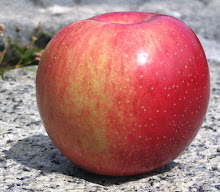 |
A local apple—Roxbury today is part of Boston—these are medium to medium-large and only partly rusetted over spring green.
Some have a coppery blush. The patchy russet is a grey brown and the underlying colors show through a little.
Roxbury's lenticels are small and often rusetted; some are larger and slightly raised. My samples run from ribbed to slightly ribbed, with a closed calyx, and are quite firm in hand.
Crisp and bracing
Roxbury Russet's flesh is crisp with a substantial and satisfying crunch, medium-grained, and light yellow with green highlights. The general impression is tart with some sugar, with hints of pear, sugar, and citrus—lime, perhaps.Like most russets, each bite makes a solid chew--not heavy or hard, but not melt-in-your-mouth either. Roxbury is bracingly refreshing.
This variety is said to be like Golden Russet but sweeter. I'm not sure about that, though my comparison is with with Golden Rs that had mellowed off the tree for at least a month.
With that caveat, the Roz's flavors are less complex than GR's. Maybe I should hold these for a month and see what develops. They are great keepers, and like most russets eat very well into December.
 They are certainly larger, and their texture is excellent.
They are certainly larger, and their texture is excellent.
Some sources say that Roxbury may be America's oldest apple, preceding even Rhode Island Greening; UMass traces it to Roxbury in the early 1600s.

Are Roxbury Russets self-fertile? I'm having trouble finding info on this.
ReplyDeleteRoxbury Russet is actually a triploid, producing sterile pollen. It needs two diploids nearby (and blooming at the same general time) to produce a good crop. One diploid would do the job, but you need two because the pollinator needs to be pollinated too, and this can't be done by a triploid.
DeleteMost apples need another fertilizing tree, but Ted Swenson of the Home Orchard Society has compiled a surprisingly long list of self-fertile varieties. It's not comprehensive, though, so it doesn't answer your question.
ReplyDeletePacific Groves says "Most apple varieties are self-sterile and require a pollinizer." Of Roxbury it specifically notes (scroll or search down) that Roxbury "needs pollinizer."
I am hedging my answer with these citations because I don't have personal knowledge, but I interpret this to be no, Roxbury, like most apples, is not self fertile.
I had a Rox today. I bought it the same time I got my Golden Russets. The G.R.'s are much sweeter and juicier. The Rox had a nice bite both in texture and acidity but not really much sweetness. My example had been in cold storage for 5-6 weeks. Personally, I would take a Golden Russet any day over the Rox.
ReplyDeleteMatt, I think Roxbury can be quite good, but it does not seem to keep quite as well (in my unscientific experience) as Golden. I am generally with you on preferring the latter.
ReplyDeleteI do seek out a few Roxbury each year in token of local pride in this old, perhaps oldest, American variety.
By the way: Here the two russets go head to head.
You should plant two to three trees for self pollination
ReplyDeleteWrong. You could plant a thousand trees of the same triploid variety and get zero apples. Because they're triploid. Regardless of ploidy, you'll need a pollenizer of a different variety since there are very few self-pollinating apple varieties.
DeleteThe colonial town of Roxbury encompassed more than the Boston neighborhood of the same name today. When this apple originated, Roxbury also included present day Jamaica Plain, Roslindale and West Roxbury, Massachusetts
ReplyDeleteOddly enough, while there seems to be general agreement that the Roz hails from Roxbury, the literature is vague about exactly where or by whom this variety fas first cultivated.
DeleteEven the venerable Apples of New York is unclear on this point.